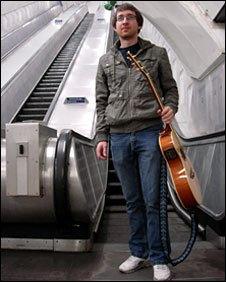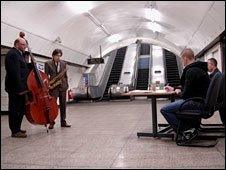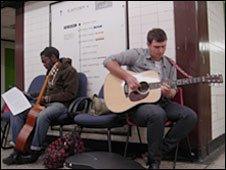Sound of the Underground
- Published
The UK's largest and most popular live music venue is seeking new stars.
No, we're not talking London's O2 or the Manchester Arena, with their capacities nudging just past 20,000. Even Wembley Stadium's 90,000 or so isn't in the running.
Home to more than 1,000 hours of live music a week, performed to countless thousands of customers, is the London Underground network.

Down in the Tube station at ... about 11 o'clock in the morning
And new performers have a chance to get in on the act as the Tube conducts its first round of auditions in two years for its licensed busking scheme.
"I have always had that sort of ambition to play on the Underground," says 26-year-old Sam Burridge, from Greenwich.
To people outside London, and beyond the UK as well, the Tube and its buskers are synonymous with the capital, he says. "It's classic London."
Breakfast at Tiffany's is Mr Burridge's first offering on acoustic guitar, on the opening morning of six weeks of auditions that will consider 168 candidates - those already whittled down from more than 400 applications.
The venue is a disused concourse deep inside Charing Cross station, where the whoops and yelps Sam adds to the singing of rock classic Born to be Wild ricochet impressively off the walls.
"You can use the ambience of the room to improve your performance," he says. "I always like it when the place echoes."
All that jazz
The busking scheme, which currently supplies about 200 performers to 38 pitches across 25 Tube stations, explicitly aims to meet "the varied musical tastes of customers".
Among a predominance of young men auditioning with pop covers and original songs on acoustic guitar, a jazz duet of double bass and saxophone stand out with versions of Puttin' on the Ritz and Take Five.
Meanwhile, 50-year-old Jeff Adams has travelled down from Northampton to deliver some traditional Mississippi Delta blues on slide guitar and harmonica.
He enjoyed the audition so much that he took a three-minute song and just kept playing, he says.
"I really enjoyed playing to the guys because they obviously appreciate their music," he says. "Because I could see how much they were enjoying it and I was feeding off of it, I doubled it - I probably played a six-minute song there.
"That's one of things about playing on the Underground - you can look at people's faces and gauge if they are enjoying it," he adds.

The city's diverse music scene should be represented across the network
London Undergound's Glenn Reffin, who runs the busking scheme, says: "We often do surveys of our customers, and overwhelmingly they support the scheme and support our buskers.
"What they like about it is it is providing them with some entertainment as they travel to work in the morning, brightening up their day when it has been raining or when they have burnt the toast."
Mr Reffin heads the three-man panel of judges, which will feature both other Underground staff and music industry professionals over the coming weeks.
"One of the people this morning was extremely good," he says. "They had a very clear, crisp voice, a very rich sound, and we all sort of looked at each other and said, 'Yeah, they've got a lot of talent.'
"The hairs on the back of the neck stood up," he says. "That's a pretty good sign."
Exposure
Talented performers at top pitches in stations like Leicester Square and Canary Wharf can earn a fair amount of money in their two-hour slots, Mr Reffin suggests.
"If you play something people recognise they will give you more money," says saxophonist Adrian Northover, of central London. "If people recognise what you are playing they think you know what you are doing."
His bandmate, bassist Pete Whyatt, adds that busking doubles up as vital practice - a significant added benefit during periods when the motivation might be lacking to put in the time at home, he says.

The cold Tube station forced some last-minute retuning
Mr Whyatt adds: "I have had gigs from it. A guy was passing and he stopped and said, 'I'm getting married in six months' time; I really liked your playing, would you come and play at my wedding?'
"You are being exposed to people and hopefully someone will like it and book you for something."
London Underground says a number of performers have secured record deals while members of the busking scheme, which launched in 2003.
Hadar Manor, whose debut CD Crossing London describes her experiences busking through Europe, has performed on national television and radio and at the Glastonbury Festival.
Jamie West, who won a licence in last year's Rhythm of London Festival, is another busker tipped for bigger things.
"You never know who is passing by," says Mr Reffin. "Somebody could be playing at Leicester Square and they might be passed by some music executive, some talent-spotter, who signs them up for a record deal."
There are several ways to get to Wembley by Tube. Maybe one of 2010's new buskers will one day find another.